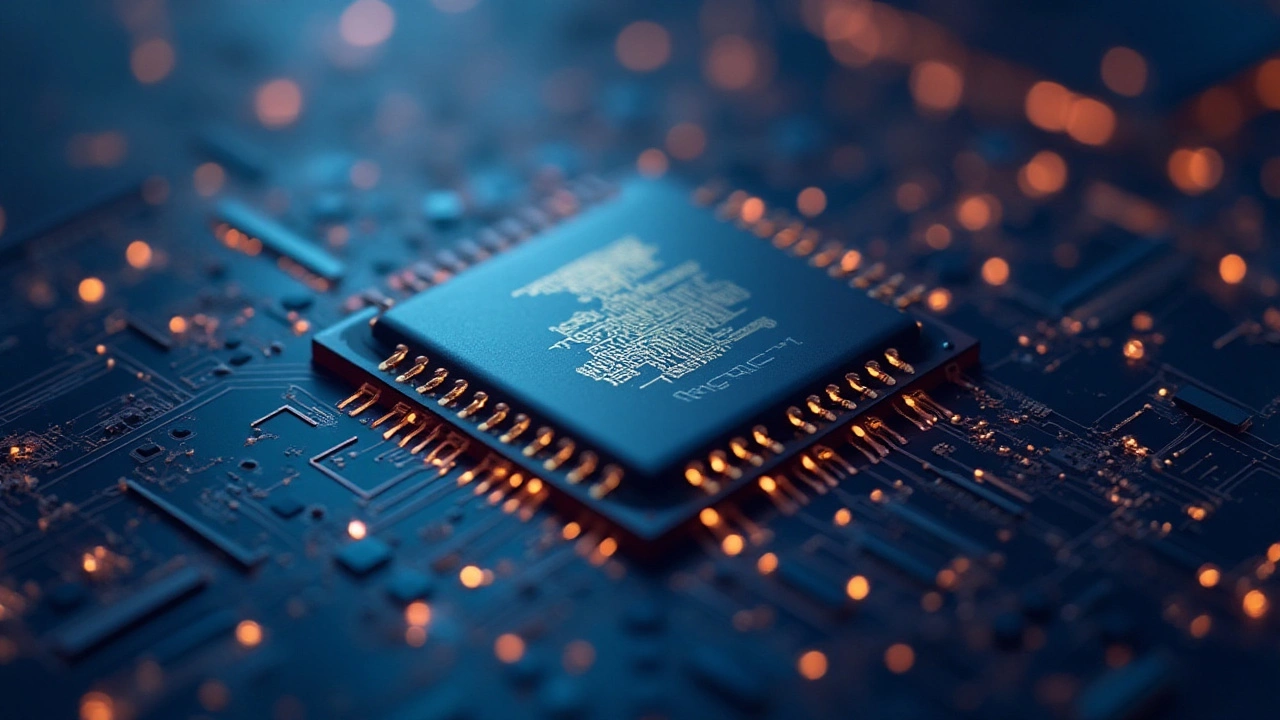In the dynamic world of semiconductors, Taiwan Semiconductor Manufacturing Company (TSMC) stands as a towering leader. Its cutting-edge technology plays a crucial role in the electronics we use daily, encompassing everything from smartphones to high-performance computers.
For Indian investors, getting a slice of TSMC means venturing into the international markets, navigating regulatory pathways, and identifying strategic opportunities. As global demand for semiconductors rises, being invested in a key player like TSMC could be a promising move.
Yet, the process isn't straightforward. It calls for a thorough understanding of trading protocols and the Indian government's regulations on foreign investment. Once these basics are clear, investing in TSMC can be rewarding, offering both exposure to technological advancements and financial growth.
- Overview of TSMC and Its Global Impact
- How to Access International Markets from India
- Steps to Invest in TSMC
- Tips for Indian Investors in the Semiconductor Sector
Overview of TSMC and Its Global Impact
Taiwan Semiconductor Manufacturing Company, popularly known as TSMC, is a cornerstone of the global electronics ecosystem. Established in 1987, TSMC pioneered the pure-play foundry business model, enabling numerous companies to bring their specialized chip designs to life without the need to own complex manufacturing facilities. This innovative model not only positioned TSMC as a key player but also transformed the broader semiconductor landscape by fostering a new era of collaboration and innovation.
TSMC’s strategic edge lies in its relentless pursuit of advanced manufacturing technologies. The company leads the charge in developing processes at smaller node sizes, effectively setting the pace for the industry. This focus on cutting-edge technology isn't just about making faster or more efficient chips; it aligns with global tech giants' needs, from Apple and NVIDIA to Qualcomm, ensuring that the latest technological marvels, such as smartphones and powerful AI processors, can operate efficiently. The impact of TSMC's contributions extends far beyond simple chip production. It shapes the capabilities of entire industries, impacting consumer technology, automotive advancements, and even national security frameworks.
The global reach of TSMC is further cemented by its commitment to meeting environmental standards and ethical practices, which resonates with the increasing demand for sustainability in manufacturing. This approach enhances TSMC’s reputation, making it a benchmark for other electronics manufacturing entities. For instance, TSMC's dedication to reducing the carbon footprint aligns with international climate goals, offering investors not just financial returns but a meaningful contribution to global sustainability efforts. This responsible approach is not merely altruistic; it reflects an understanding that future growth is intertwined with ecological and social considerations.
The strategic significance of TSMC is not lost on global markets. As the company continues to innovate and expand, its influence and contribution to GDP in regions where it operates are noteworthy. The numbers speak for themselves: TSMC accounts for more than 50% of the global pure-play foundry market. Such dominance underscores the company's critical role in technological advancements and economic impacts globally.
"The success of TSMC is crucial not only for technological innovation but also for the economic balance of technology industries worldwide," says Mark Liu, the current chairman of TSMC.

How to Access International Markets from India
For Indian investors keen on entering the international investment scene, accessing foreign markets may seem like an uphill battle. However, with the right approach and tools, investing in global giants like TSMC is achievable. The first step involves understanding the regulatory landscape, as the Reserve Bank of India (RBI) governs the procedures through the Liberalized Remittance Scheme (LRS). This scheme permits Indian residents to remit up to USD 250,000 per financial year for permissible current or capital account transactions. Such a mechanism enables investors to buy foreign stocks and diversify their portfolios effectively.
A primary consideration when venturing into international trading is choosing the right brokerage platform. India has seen a rise in domestic brokers offering services to trade in foreign stocks, but some may partner with international entities. These platforms simplify the currency conversion process, provide research tools, and allow seamless transactions, making it convenient for users to trade in international markets. Popular platforms such as Interactive Brokers and Vested are gaining traction, offering easy access to various global stock exchanges. Be sure to compare their fees, features, and customer support before making a decision.
It's essential for investors to be aware of the taxation policies affecting foreign investments. Profits from global equities must be declared and are subject to taxation in India. Long-term capital gains (holding period exceeding two years) from overseas shares attract a tax rate of 20% with indexation, while short-term gains are added to your income and taxed at the applicable slab rate. Keeping compliant with tax regulations not only avoids legal hassles but also optimizes your investment strategy. As one veteran trader remarked,
"In the realm of international trading, awareness of the regulatory and tax environment is as crucial as being aware of the market trends themselves."
Additionally, analyzing foreign exchange rates is pivotal. Currency fluctuations can significantly impact your returns, especially when the Indian Rupee fluctuates against the US Dollar where most international trades are conducted. Leveraging semiconductor stocks like TSMC could expose you to both market risks and foreign exchange-related risks. While it is challenging to predict these changes, keeping an eye on macroeconomic indicators such as inflation rates and monetary policies can offer insights into currency movements.
For investors seeking a more hands-off approach yet interested in the semiconductor sector, exchange-traded funds (ETFs) can be an attractive option. Certain ETFs focus on emerging markets and technology sectors, providing broad exposure without requiring individual stock management. Recent data shows a rising trend in investments through such vehicles, thus ensuring diversification along with exposure to high-growth areas. ETFs, while limiting potential gains from holding individual stocks like TSMC, offer lower risk and volatility.
Lastly, staying informed is crucial. The international markets are influenced by global events, geopolitical tensions, and technological advancements. Subscribing to reputed financial news outlets or using advanced analytical tools can provide timely information, helping investors make informed decisions. Being proactive and adapting to market changes will always remain a cornerstone of successful international investing.

Steps to Invest in TSMC
Investing in TSMC for Indian investors involves several detailed steps, paving the way to tap into the lucrative semiconductor market. The very first stage is setting up an international brokerage account. Unlike domestic brokerage accounts, these are specialized to facilitate trading in foreign stocks. It's essential to choose a reliable brokerage firm that offers access to U.S. stock exchanges, such as NASDAQ, where TSMC is listed as an American Depositary Receipt (ADR). Notably, brokers like Charles Schwab, Interactive Brokers, and TD Ameritrade accommodate Indian investors and provide a seamless platform for international trading.
After selecting a brokerage, the next critical step is to complete the Know Your Customer (KYC) process. This regulatory requirement involves submitting necessary identification documents such as a valid passport or PAN card. The rigorous KYC process ensures that the brokerage complies with international financial regulations and safeguards both the investment institution and investors from potential fraud.
With your account set up and activated, funding it is the next logical move. Due to RBI's Liberalized Remittance Scheme (LRS), Indian residents can legally transfer up to $250,000 annually for investing in foreign markets. This limit allows a substantial amount of capital for purchasing shares of international giants like TSMC. Remember that currency exchange fees can impact your overall available capital, so accounting for these charges is prudent.
"The advent of globalization has opened up immense opportunities for international investments, and understanding the nuanced pathways is key to leveraging such benefits,” highlights Ravi Menon, a renowned financial analyst.
Once the funds are in the account, the thrilling part begins – actually buying TSMC shares! Using your brokerage’s online platform, search for TSMC by its ticker symbol ‘TSM’ and assess its current pricing and market trends. Drawing insights from financial reports and understanding market fluctuations is beneficial to make informed decisions. As the semiconductor industry is highly volatile, keeping a keen eye on technological advances and market demands can aid in making strategic purchase choices.
After purchasing, owning international stocks implicates understanding tax responsibilities. Dividend income and capital gains from foreign investments can be subject to different tax deductions. Familiarizing yourself with the Double Taxation Avoidance Agreement (DTAA) between India and the respective country is critical. It helps in avoiding being taxed twice and ensures compliance with both Indian and international tax regimes.
Finally, ongoing monitoring and potentially adjusting your investment strategy ensure that your portfolio remains robust and aligned with your financial goals. Utilizing analytics tools provided by the brokerage, staying updated with industry reports, and possibly consulting a financial advisor are proactive measures worth considering. By conscientiously navigating these steps, investing in TSMC becomes a strategic endeavor, linking you to boundless opportunities in the technology sector.
Tips for Indian Investors in the Semiconductor Sector
For Indian investors eyeing the lucrative semiconductor industry, understanding market dynamics is essential. The semiconductor sector is driven by rapid technological advancements and an ever-growing global demand for integrated circuits and chips. To invest successfully, it's crucial to stay updated with industry trends, like the rise of 5G, AI, and IoT, which heavily rely on semiconductor technology. Subscribing to industry-related publications or digital resources can provide valuable insights on emerging patterns in semiconductor usage. Regularly entering into discussions or forums with fellow investors can also widen understanding, offering different perspectives on potential risks and opportunities.
Building a diversified portfolio within the semiconductor sector is another recommended strategy. Instead of putting all eggs in one basket, consider spreading investments across different companies involved in the semiconductor supply chain. This includes investing in raw material producers, chip designers, and manufacturing giants like TSMC. A diversified approach can hedge against market volatility, offering a more stable return on investment. Collaborate with financial advisors who specialize in international markets to craft an investment strategy that aligns with personal financial goals and risk tolerance.
Understanding the regulatory landscape in India regarding foreign investment is paramount. With government initiatives like Make in India, many policies aim to promote local manufacturing, impacting foreign companies' operations. Hence, staying informed about policy changes or announcements that could affect international trading is vital. As financial regulations evolve, seek guidance from professionals adept in cross-border investments to comply with the legal requirements.
Timing is an undervalued component when investing in semiconductors. The market often experiences cyclical patterns, influenced by factors like production innovations or geopolitical developments. Historical data analysis can reveal periods of growth or contraction, assisting in making informed decisions. A strategic approach to buying or selling stocks, considering these cycles, often results in more favorable investment outcomes.
Engaging with Expert Analysis
Utilizing expert analysis can greatly enhance investment strategies. Many financial analysts specialize in the semiconductor sector, providing reports that dissect current financial statuses, forecast trends, and evaluate company performances. Engaging with this content allows investors to grasp a company like TSMC's position within the market, understanding how macroeconomic factors might impact its stock. Joining investment webinars or seminars on the semiconductor industry, often featuring industry veterans, can shed light on pioneering technologies and shifts in demand.
Lastly, patience is a virtue that should not be underestimated in this field. As with any volatile market, knee-jerk reactions can lead to financial setbacks. Even when stocks fluctuate, maintaining investment discipline can prevent unnecessary losses. Regularly reviewing personal investment strategies at set intervals, rather than reacting to short-term market changes, often results in a more prosperous investment journey.
| Factor | Consideration for Investors |
|---|---|
| Industry Trends | Rise of 5G, AI, IoT |
| Diversification | Spread investments across supply chain |
| Regulatory Factors | Stay informed about policy changes |
| Timing | Be aware of market cycles |
"Investing in the semiconductor sector requires a strong grip on global trends and local regulations," says Rajiv Jain, a renowned financial analyst at Global Equity Analysis.






